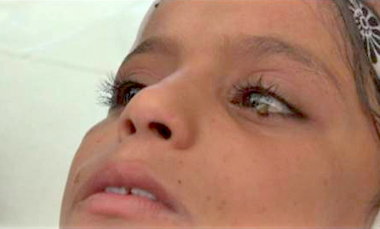 Sana’a, Feb 9: The father of an eight-year-old Yemeni girl who has recently started crying stones has urged philanthropists to help him treating his daughter from her baffling condition.
Sana’a, Feb 9: The father of an eight-year-old Yemeni girl who has recently started crying stones has urged philanthropists to help him treating his daughter from her baffling condition.
Mohammad Saleh Al Jaharani, said that the eyes of his daughter, Saadia, began producing stones 14 days ago and has spent thousands of Yemeni Rials on visits to local doctors.
“I once spent YR50,000 (Dh870) a day on treatment. She has done many X-rays in local clinics. Doctors said that they detected nothing extraordinary with her eyes,” he said.
A Yo Tube video prepared by the Yemeni Azal TV showed the girl’s eyes producing tiny gravel-like stones from underneath her eye lids instead of tears.
The girl also cries tears and her eyes do not produce stones when she is asleep. Most of stones come out in the afternoon and the evening. Stones do not hurt and she lives a normal life.
A father of 20 children from two wives, Jaharani said that Saadia’s eyes sometimes produce as many as 100 stones a day. “None of my other children has ever gone through the same condition.”
The girl does not go to school. Her father said he did not send any of his nine daughters to school as it is far from his home. Only his sons study.
Local doctors were not immediately available to comment on the girl’s case. However, a local doctor interviewed by the channel said that he could not find any scientific explanation to the phenomenon.
Abdul Kareem Al Ayashi, the producer of the channel’s video, said that local doctors could not examine the stones due to lack of technology.
“People are digesting many mythical explanations to the girl’s condition. Some people say she is possessed. Others say she is under a black magic spell,” he said.
Saadia’s strange case is the second in the same province. A year ago, local media shed light on the condition of Saboura Hassan Al Fagiah, a 15-year-old girl from Bajel city who suffered from the same symptoms.
Local media said at that time that Sabura’s strange phenomenon occurred six months after her wedding and began experiencing hours of unconsciousness and a swollen abdomen.
Al Ayashi said that charitable donors quickly responded to Saboura’s appeal for help. “Saboura was luckier than Saadia and was treated in Jordan. She cries normally now.”





Comments
Add new comment